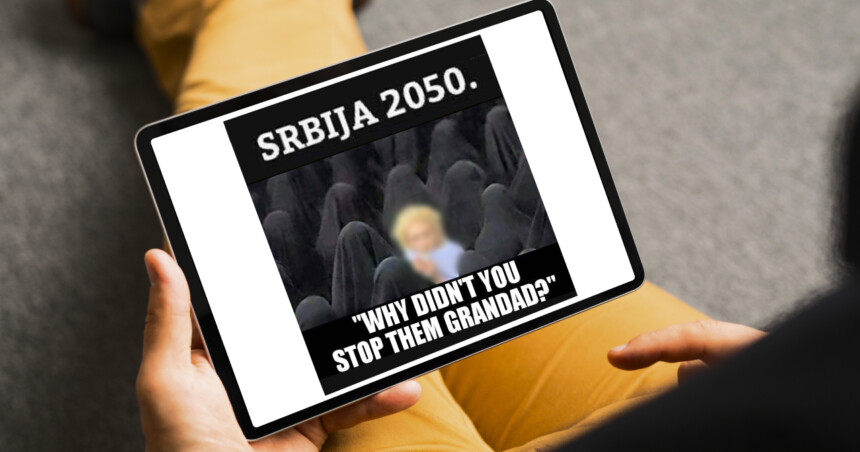As a cyber world, the Internet is virtual and yet parallel and strongly connected to the daily lives of everyone today.
It is a powerful tool, but the level of Islamophobia expressed through social networks and in general is growing at such speed that many readers don’t have a chance to process this fact.
And it is difficult, in fact, to differentiate an explicit hatred of Islam from an implicit or subtle fear of Islam.
What is wrong with a simple meme?
Mass manipulation is a “normal” thing in today’s world — of course, we are talking here about media in general, not only online.
In the main article image, we have a current example that is shaking relations between Serbs and Bosniaks in the online sphere.
Yet, we cannot “blame” it all on mainstream media such as TV networks, but more and more on ordinary Internet users.
Unfortunately, regular, obedient, tax-paying citizens can be part of widespread indoctrination, all that is needed are prerequisite devices.
For example, by making a simple meme and spreading it!
Minimal effort, maximum harm
Islamophobia is one of the fields where such a meme maker can find solid inspiration.
Such a thing has happened in the Balkans several times (including now), more precisely in the cyberspace between Serbia and Bosnia.
An unknown author has made a relatively simple meme which is circulating across the Web, with a chilling warning, considering what happened in Bosnia around three decades ago.
As a quick reminder, what happened there thirty years ago was a genocide against Bosnian Muslims, committed by the Yugoslav-Serb army.
It was the first genocide on European soil since World War Two, until today.
Meaning behind the meme
So what actually happened with this one provocative meme?
It caused certain attention among those who agree with what’s written on it and those who are worried about the same.
It is an image of a woman, having (what they may argue to be stylishly-dyed) blonde hair, with an air of neo-punk rock fashion, dressed in white, while surrounded by countless women in black niqāb.
This woman is stood looking in one direction, and all the other women — maybe there are also men among them? — have their backs turned and seem to be moving or standing, in the opposite direction.
In the upper part of the picture, there is text saying “Srbija 2050” (Serbia 2050) and at the bottom it says,
Deda, zašto ih nisi zaustavio?” (Grandfather, why didn’t you stop them?)
Europe under threat is the implied message
Here, it is not implied that only Serbia is “threatened” by numerous women in niqāb, chador, hijab, and abaya.
Rather, it is suggested that the whole of Europe, perhaps the whole of the Western geopolitical hemisphere is at risk.
In other words, Serbia is apparently once again on the frontlines of European civilisation, like it was only three decades ago, and Europe just doesn’t see it(!)
But how do we know this meme is not only about Serbia but the Western geopolitical hemisphere?
Well, if the woman in the picture was dressed in Serb national attire or folk clothing, then it would seem more like they were worried about losing their ethnic, national, or cultural identity.
But no, she is “modern” and with blonde hair, so leaning towards the “Aryan type” so admired by neo-Nazis.
If anything, she could easily have just arrived from London, Rome, New York, or Paris, either from the catwalk or a rocker fashion milieu.
Further possible implications
The contemporary visual trend contained with reference to the middle of the 21st Gregorian century points to Western secularism needing protection, evidently via Serbia.
It is also possible that the female figure in the picture was taken from another meme and then repurposed for Serbian xenophobia.
In any case, by 2050, if something is not done, you might expect a flood of burqas throughout Serbia, to the detriment of secularly bleached — both literally and figuratively — people.
Along the way, there is also quiet symbolism in the fact that she is white, like an angel surrounded by a multitude of dark apparitions.
This kind of visual propaganda is extremely dangerous.
Blaming past generations for the Muslim problem
The second part of the text is perhaps more interesting.
Ancestors are mentioned, one of the favourite terms for indoctrination in Serbia.
Specifically, someone is addressing their grandfather — perhaps the woman from the picture, perhaps not.
What is clear is the bitterness that blames one’s grandfather for failing or choosing not to stop this “infestation” several decades earlier.
To be honest, the word today is a broader term in the range of years, so Yugoslav wars from the 1990s can also be included. Therefore, those who say something like this to their grandfathers either do not know the fact or pretend not to know how “grandfather” in his younger days thoroughly worked to “stop” covered women such as those in the image.
Your grandfather helped wipe out Muslims!
He expelled, raped, shot, and threw them into pits.
He certainly tried. But many of them survived and continued to multiply.
Grandfather’s grandfather also tried his best in his time; he removed the hijab and niqāb from many women through the imposed communist laws, both peacefully and by force, but he did not manage to do it permanently either.
If we go to other parts of the world, other battlefields, dictatorships, or even earlier historical eras, we would find more examples of grandfather’s efforts in the above activities.
A close look at what those grandfathers did in the Serbian region is enough for now.
Bosniaks who allow this fascism to persist
And let us remind ourselves that there are a certain number of Bosniaks who support or do not challenge this contemporary manifestation of the latest type of fascism masked as “progressive and secular anti-fascism”.
There are those who agree with this meme’s message, especially when the story of the famous Yugo-nostalgia is brought up in correlation with the forced removal of headscarves on thousands of Bosnian and Albanian Muslim girls and women in that same country.
Their moral and spiritual condition is a separate phenomenon to be studied.
Please look at facts; avoid xenophobia
Today, there is an increased number of Bosnian Muslim women and girls wearing hijabs than during the times of communist Yugoslavia. And a small number of them don the niqāb too. Alhamdulillāh for this.
However, their numbers are not so high as someone may expect in a European country such as Bosnia, where the majority of people consider themselves Muslim.
Tellingly, the meme covered in this article does not mention Bosniaks or Albanians specifically, but a country — Serbia — that is complaining or criticising someone’s ineffective grandfather, someone worried about the image and demography of the country in the near future.
In this case, the Serb army committed genocide against Bosnian Muslims (more than once) and partly Albanian Muslims in the country of Kosovo.
It was not against Middle Eastern, African, or Asian Muslims, but their own neighbours.
Images show people still harbour evil thoughts
This so-called meme does not represent any political programme similar to those in the past, but it does show what’s happening in the minds of ordinary people.
These are your typical, average Internet users that are sharing such images.
When we look at the kind of dark thoughts they are expressing — with clearly still fresh ideological wounds — our cyberwar continues. And it is one that can easily spill over into reality, if we do not work towards sharing proper information.
Facts and correct narratives are the number one thing for us to control in such a battle, we must do our part in fighting this xenophobia and anti-Muslim hatred.
Source: Islam21c







